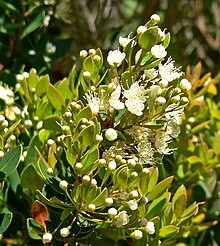Amomyrtus
Appearance
| Amomyrtus | |
|---|---|

| |
| Amomyrtus meli | |
| Scientific classification | |
| Kingdom: | Plantae |
| Clade: | Tracheophytes |
| Clade: | Angiosperms |
| Clade: | Eudicots |
| Clade: | Rosids |
| Order: | Myrtales |
| Family: | Myrtaceae |
| Subfamily: | Myrtoideae |
| Tribe: | Myrteae |
| Genus: | Amomyrtus (Burret) D.Legrand & Kausel |
Amomyrtus is a genus of flowering plants in the myrtle family, Myrtaceae described as a genus in 1948.[1][2] It is native to temperate southern South America, where it is distributed in Chile and Argentina.[3][4]
These plants produce large, white flowers with abundant pollen and fleshy black fruits containing one to three seeds. They are self-compatible.[4]
The name Amomyrtus comes from the Greek Amos, very fragrant; and Myrtus from family's name.
Species
[edit]Species[3]
| Image | Scientific name | Description | Distribution |
|---|---|---|---|
 |
Amomyrtus luma (Molina) D.Legrand & Kausel, | a shrub or tree | the humid forests of Chile and Argentina |
 |
Amomyrtus meli (Phil.) D.Legrand & Kausel, | a large tree | the rainforests of Chile |
References
[edit]Wikimedia Commons has media related to Amomyrtus.
- ^ Legrand, Carlos Maria Diego Enrique & Kausel, Eberhard Max Leopold. 1948. Lilloa 13: 145
- ^ Tropicos, Amomyrtus (Burret) D. Legrand & Kausel
- ^ a b Kew World Checklist of Selected Plant Families
- ^ a b Arroyo, M. T. K. and A. M. Humaña. (1999). Breeding systems of two endemic rainforest species in southern Chile: Amomyrtus meli (Phil.) Legr. et Kaus. (Myrtaceae) and Luzuriaga polyphylla (Hook.) Macbr. (Philesiaceae). Archived September 21, 2013, at the Wayback Machine Guyana Bot 56(1) 31-37.
